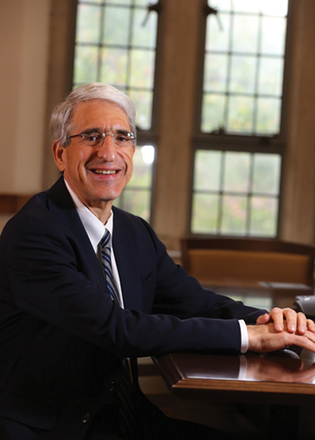 loading
loading
President's LetterMaking the old new at the Peabody Mark OstowThe Yale Alumni Magazine publishes a letter from President Peter Salovey ’86PhD in every issue. In this letter, the president looks forward to the 2024 opening of a newly renovated Peabody Museum. View full imageDear Friends, I remember entering the Peabody Museum back in the 1980s and marveling at what seemed a portal into a distant but lively past. Later, Marta and I would bring our nieces and nephews for visits. The Age of Reptiles mural—with its extraordinary scale and vivid palette—seemed to bring the dinosaurs to life. (Rudy Zallinger ’42BFA, ’71MFA, the Pulitzer award-winning artist who painted that mural in the 1940s, and I became friends through the Davenport College Fellowship.) The gems on display in the Hall of Minerals, Earth, and Space showed how the natural configurations of tiny molecules and compounds can become beautiful stones. The fossil halls contained an extensive record of life in prehistoric times. These very old items—new to me then—reminded me of my own childhood. When I was young, my parents took me to the Museum of Natural History in New York City and the Newark Museum, places that opened my eyes and mind. And when I see families and school groups bringing children to the Peabody, I delight in knowing how this experience will not only educate them but also spark lifelong excitement and curiosity. In fact, one of those nephews who used to visit the Peabody with us when he was a young child now works there as an artist and exhibit designer. The Peabody Museum was formally founded in 1866 with a gift from the uncle of Othniel Charles Marsh ’60, professor of paleontology and the museum’s first director. Marsh vastly expanded the collections from the museum’s modest origins, acquiring skeletons, fossils, fossil footprints, and archaeological and cultural materials. The first museum building opened in 1876, and then the current building—whose Great Hall was built specifically to accommodate enormous dinosaur bones that Marsh had collected—opened in 1925. The museum and its collections continued to grow over the years, and in 2016 it celebrated its sesquicentennial. More than 150,000 people, including thousands of schoolchildren, visit each year. It is the most visited place in the state by a Connecticut schoolchild. For many, the Peabody serves as Yale’s front door. Visiting has a magical effect on kids: it sparks love for dinosaurs, fossils, and natural history; it shows them how exciting museums—and scientific research—can be; and it gives them a wonderful feel for Yale. The Peabody has been under renovation since 2020 and is soon to reopen in spring 2024. When it does, it will be more accessible to all visitors: like Yale’s other museums, admission to the Peabody will be free. New exhibitions have been redesigned, and the museum’s curatorial voice will now include members of the New Haven community. Fixtures, seating areas, and non-gallery spaces will welcome both students and local families. It will be a space that brings people together—from Yale, New Haven, and beyond. The new Peabody will be an educational space that even more effectively centers teaching and learning. There are new classrooms throughout the building, both behind the scenes and near the public galleries. A new K-12 Education Center will offer special educational opportunities for visiting students as well as an after-school program. The museum’s Student Exhibition Gallery will feature entirely student-curated exhibitions throughout the year. Many of you will recall the Brontosaurus specimen that towered over visitors for almost a century. Many of these skeletons will return in more lifelike poses that reflect our new knowledge that dinosaurs were not slow, lumbering creatures, as they have often been depicted—but were in fact alert and lively animals. When the Peabody reopens, I invite you to make time to explore it—I think you will enjoy this renewed portal into the past and present. To learn more about the museum and its reopening, visit peabody.yale.edu.
The comment period has expired.
|
|